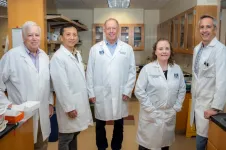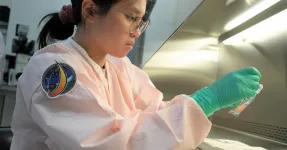(Press-News.org) We are quite good at spotting unexpected objects while focused on another activity if they are moving fast, reveals a new study by a team of New York University researchers. Their findings cast doubt on a long-standing view that our ability to see the unexpected is necessarily impaired when our attention is already directed elsewhere.
“For decades, it’s been thought that when we’re intently focused on something relevant, like driving or playing a game, we fail to spot something that unexpectedly enters our field of vision, even if it is clearly visible and moving,” says Pascal Wallisch, a clinical associate professor at New York University’s Center for Data Science and Department of Psychology and lead author of the paper, which appears in the Proceedings of the National Academy of Sciences. “Our study questions the generality of this view because it shows that people, while focusing on a task, are quite capable of noticing unexpected objects that are moving quickly. However, our research confirms that we are indeed less adept at noticing these same objects when they are moving slowly.”
The research team, who also included Wayne Mackey, Michael Karlovich, and David Heeger, centered its study on “inattentional blindness”—the inability to notice unexpected objects if attention is focused on a task. This phenomenon was evident in the widely cited 1990s “invisible gorilla experiment.” In that study, the participants—watching a video of students passing basketballs—did not notice an unexpectedly appearing person in a gorilla costume because they were already tasked with, and engaged in, counting the number of passes between players wearing white shirts.
This and similar studies characterized one of the most striking phenomena in cognitive psychology—inattentional blindness—as an inevitable flip side of task focusing, and essentially a deficit.
In the PNAS study, the NYU research team sought to better understand the nature of inattentional blindness through a series of experiments—and, specifically, whether our cognitive processing was indeed as limited as this previous work suggested.
They replicated the invisible gorilla experiment using more than 1,500 of research participants—but including several new conditions. In the original 1999 experiment, the gorilla moved slowly as well as upright—like a human (which it was!).
In the new PNAS research, research participants saw the gorilla (yes, also a human dressed in a gorilla costume) in additional ways. Specifically, the “NYU gorilla” moved at various speeds—in some conditions, just a little faster than the “original gorilla” and, in others, substantially faster than the original gorilla. During these experiments—just like in the original experiment—research participants were tasked with counting the number of basketball passes made by players wearing black or white shirts.
A video of the experiment may be viewed here.
Overall, the results showed that participants, while engaged in the pass-counting task, were more likely to spot the NYU gorilla if it was moving substantially faster than in the original 1999 experiment or if it was leaping instead of walking.
To ensure these findings generalize beyond spotting gorillas, the researchers then conducted a series of experiments, using approximately 3,000 other participants, that replicated the principles of the invisible gorilla study. In these, research participants were asked to count how many randomly moving dots of a given color were crossing a central line while an unexpected moving object (UMO) —a triangle— was traversing the screen at various speeds.
As with the gorilla study, the participants were more likely to spot the triangle the faster it was moving. Importantly, the authors note, the same was not observed for triangles that were moving slower than the dots, which is remarkable given that the slower moving triangles are on the screen substantially longer. This finding also rules out the following: that the noticeability of the fast moving UMOs is simply due to physical dissimilarity to the task-relevant dots. As the authors write in the paper:
“(O)ur findings…contribute to the ongoing debate on the impact of physical salience on inattentional blindness, suggesting that it is fast speeds specifically, not the physical salience of a feature more generally, that captures attention.”
The findings also might also have evolutionary implications. The classical view of inattentional blindness would leave a task-focused organism vulnerable to unexpected threats. These new PNAS findings, by contrast, suggest that organisms possess a “sentinel” system that constantly monitors the environment. This system alerts organisms to potential threats—specifically, fast-moving attacking predators.
“Fast-moving, unexpected objects seem to override the task focus of an organism,” says Wallisch. “This will allow it to notice and react to the new potential threat, improving chances of survival.”
The research was supported by a grant from the National Science Foundation (DGE 1342536).
# # #
END
Are we truly “inattentionally blind”? New study revisits “invisible gorilla” experiment for new insights
Research reveals we can spot the unexpected better than commonly believed
2023-05-23
ELSE PRESS RELEASES FROM THIS DATE:
Putting the brakes on accelerated aging of bone, muscle from HIV infection, treatment
2023-05-23
AUGUSTA, Ga. (May 23, 2023) – Antiretroviral cocktails can make human immunodeficiency virus, or HIV, undetectable and untransmittable, but both the virus and its treatment can also accelerate aging of bone and muscle.
Now Medical College of Georgia scientists are looking at drugs already being studied in clinical trials for cancer to help put the brakes on these classic indicators of aging that can lead to falls, fractures and early frailty.
“These drugs are doing what they are supposed to be doing: ...
Viewers actually 'binge-watch' TV with a lot of self-control
2023-05-23
If viewers sometimes feel guilty about binge-watching television programing, they really shouldn’t. Though its name implies impulsive behavior, binge-watching TV is a common activity planned out by viewers, suggests new research from the University of California San Diego’s Rady School of Management and School of Global Policy and Strategy.
The study, in collaboration with the Tepper School of Business at Carnegie Mellon University and Fox School of Business at Temple University, reveals that viewers prefer to binge-watch ...
Prescribed burns encourage foul-smelling invaders
2023-05-23
Though prescribed burns reduce wildfire threats and even improve habitat for some animals, new research shows these fires also spread stinknet, an aptly named weed currently invading superblooms across the Southwestern U.S.
Stinknet, also called globe chamomile, is native to South Africa, but is commonly seen in photos of California’s colorful superblooms. “Not all flowering plants are indicative of a healthy ecosystem,” said Loralee Larios, UC Riverside assistant botany professor and study co-author. “This one isn’t.”
In addition ...
Investigation reveals “shocking” epidemic of sexual assault in the NHS
2023-05-23
A joint investigation published today by The BMJ and The Guardian finds that NHS trusts recorded more than 35,000 cases of rape, sexual assault, harassment, stalking, and abusive remarks, between 2017 and 2022. The findings, which show that NHS trusts are failing to protect staff and patients, have led to calls for an independent inquiry.
The data, based on responses to Freedom of Information (FOI) requests from 212 NHS trusts and 37 police forces in England, show that a total of 35,606 sexual safety incidents were recorded ...
3 undergraduate researchers from Argonne selected for National Science Foundation Graduate Research Fellowship Program
2023-05-23
Argonne supports students’ ongoing engagement with the lab and scientific research by helping them secure a graduate fellowship.
Three students who have completed their participation in the Science Undergraduate Laboratory Internships (SULI) Science Undergraduate Laboratory Internships Program at the U.S. Department of Energy’s (DOE) Argonne National Laboratory were accepted into the National Science Foundation’s (NSF) Graduate Research Fellowship Program (GRFP). Their achievements highlight the important role Argonne plays in students’ continued engagement in science, technology, engineering and mathematics (science, technology, ...
UC San Diego first to test cancer drugs in space using private astronaut mission
2023-05-23
On May 21, 2023, scientists at University of California San Diego Sanford Stem Cell Institute launched several new nanobioreactor experiments onto the International Space Station (ISS) via the second Axiom Space Private Astronaut Mission, Axiom Mission 2 (Ax-2). The latest experiments expand their research on human stem cell aging, inflammation and cancer in low Earth orbit.
Increasing evidence shows that microgravity conditions can accelerate aging, inflammation and immune dysfunction in human stem cells. Understanding this process is not only helpful for keeping astronauts healthy — it could also teach us how to better treat ...
Research favors testing and voluntary isolation over closures in disease outbreaks
2023-05-23
Regular diagnostic testing and self-isolation can be more effective than school and business closures when it comes to combating infectious disease outbreaks such as COVID-19, according to a new study by University of Wyoming researchers.
The findings appear today (Monday) in Scientific Reports, an online, open access journal from the publishers of Nature.
UW Department of Economics faculty members Stephen Newbold, David Finnoff, Jason Shogren and Linda Thunstrom, along with recent Ph.D. graduate Madison Ashworth, developed an epidemiological and economic model to compare the effectiveness of physical distancing mandates with policies encouraging regular testing and ...
Researchers examine cooling power plants with brackish groundwater
2023-05-23
A new analysis led by a University of Wyoming researcher shows that brackish or salty groundwater has the potential to replace fresh water to cool coal- and natural gas-fired power plants and strengthen resilience in the energy infrastructure, although there’s a cost associated with doing so.
With freshwater supplies threatened due to drought, climate change and rapid socioeconomic growth, water competition is increasing between the electric power sector and other sectors. While transitioning to a low-carbon energy future, decarbonization of fossil fuel-fired power plants by carbon capture and storage would significantly ...
In 2050, over 800 million people globally estimated to be living with back pain
2023-05-23
Analysis of over 30 years of data has shown the number of cases of low back pain is growing, with modelling suggesting by 2050, 843 million people will be affected by the condition largely due to population increases and ageing of populations.
The continued lack of a consistent approach on back pain treatment, and limited treatment options have researchers concerned that this will lead to a healthcare crisis, as low back pain is the leading cause of disability in the world.
In Australia, there will be a nearly 50 percent increase ...
Psychology: Unidentified aerial phenomena observations reported by almost one fifth of academic survey respondents
2023-05-23
19% of respondents to a survey of academics report that they or someone they know have witnessed unidentified aerial phenomena (UAP) — observations of the sky that cannot be identified as aircraft or as known natural phenomena — and 37% report some degree of interest in conducting research into UAP. The findings, which are based on a survey of 1,460 US academics, are published in Humanities and Social Science Communications and highlight that many academics consider the evaluation of UAP to be worthy of academic scrutiny.
Marissa Yingling, Charlton Yingling and Bethany Bell surveyed professors, ...
LAST 30 PRESS RELEASES:
New study identifies growth hormone receptor as possible target to improve lung cancer treatment
Routine helps children adjust to school, but harsh parenting may undo benefits
IEEE honors Pitt’s Fang Peng with medal in power engineering
SwRI and the NPSS Consortium release new version of NPSS® software with improved functionality
Study identifies molecular cause of taste loss after COVID
Accounting for soil saturation enhances atmospheric river flood warnings
The research that got sick veterans treatment
Study finds that on-demand wage access boosts savings and financial engagement for low-wage workers
Antarctica has lost 10 times the size of Greater Los Angeles in ice over 30 years
Scared of spiders? The real horror story is a world without them
New study moves nanomedicine one step closer to better and safer drug delivery
Illinois team tests the costs, benefits of agrivoltaics across the Midwest
Highly stable self-rectifying memristor arrays: Enabling reliable neuromorphic computing via multi-state regulation
Composite superionic electrolytes for pressure-less solid-state batteries achieved by continuously perpendicularly aligned 2D pathways
Exploring why some people may prefer alcohol over other rewards
How expectations about artificial sweeteners may affect their taste
Ultrasound AI receives FDA De Novo clearance for delivery date AI technology
Amino acid residue-driven nanoparticle targeting of protein cavities beyond size complementarity
New AI algorithm enables scientific monitoring of "blue tears"
Insufficient sleep among US adolescents across behavioral risk groups
Long COVID and recovery among US adults
Trends in poverty and birth outcomes in the US
Heterogeneity of treatment effects of GLP-1 RAs for weight loss in adults
Within-person association between daily screen use and sleep in youth
Low-dose lithium for mild cognitive impairment
Catheter ablation and oral anticoagulation for secondary stroke prevention in atrial fibrillation
A new theory of brain development
Pilot clinical trial suggests low dose lithium may slow verbal memory decline
Bioprinting muscle that knows how to align its cells just as in the human body
A hair-thin fiber can read the chemistry of a single drop of body fluid
[Press-News.org] Are we truly “inattentionally blind”? New study revisits “invisible gorilla” experiment for new insightsResearch reveals we can spot the unexpected better than commonly believed



